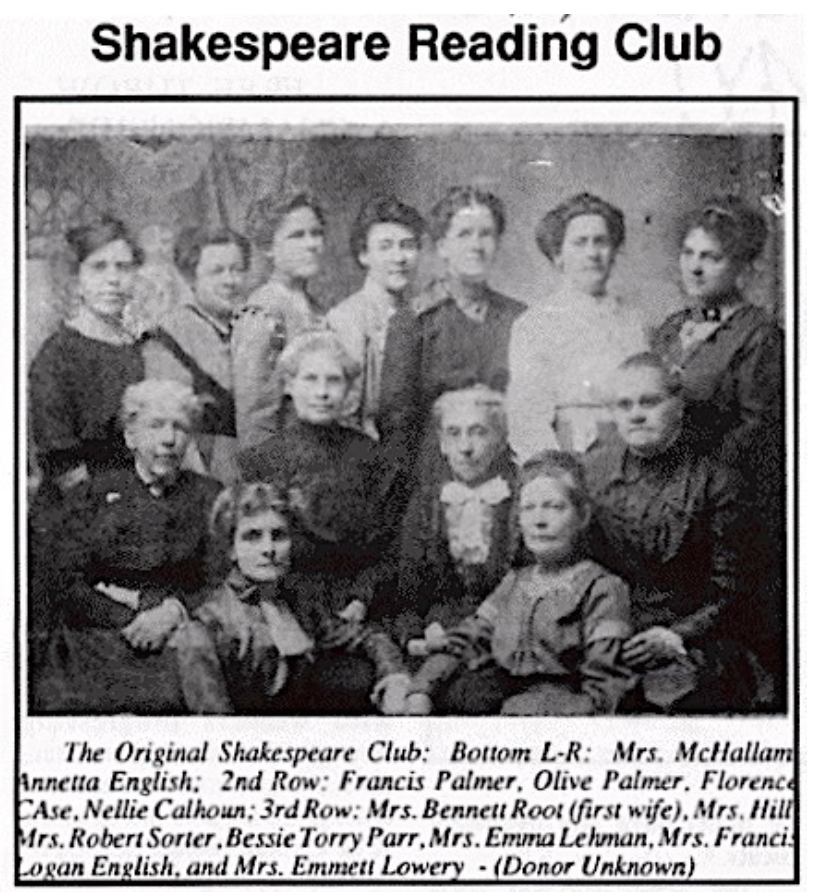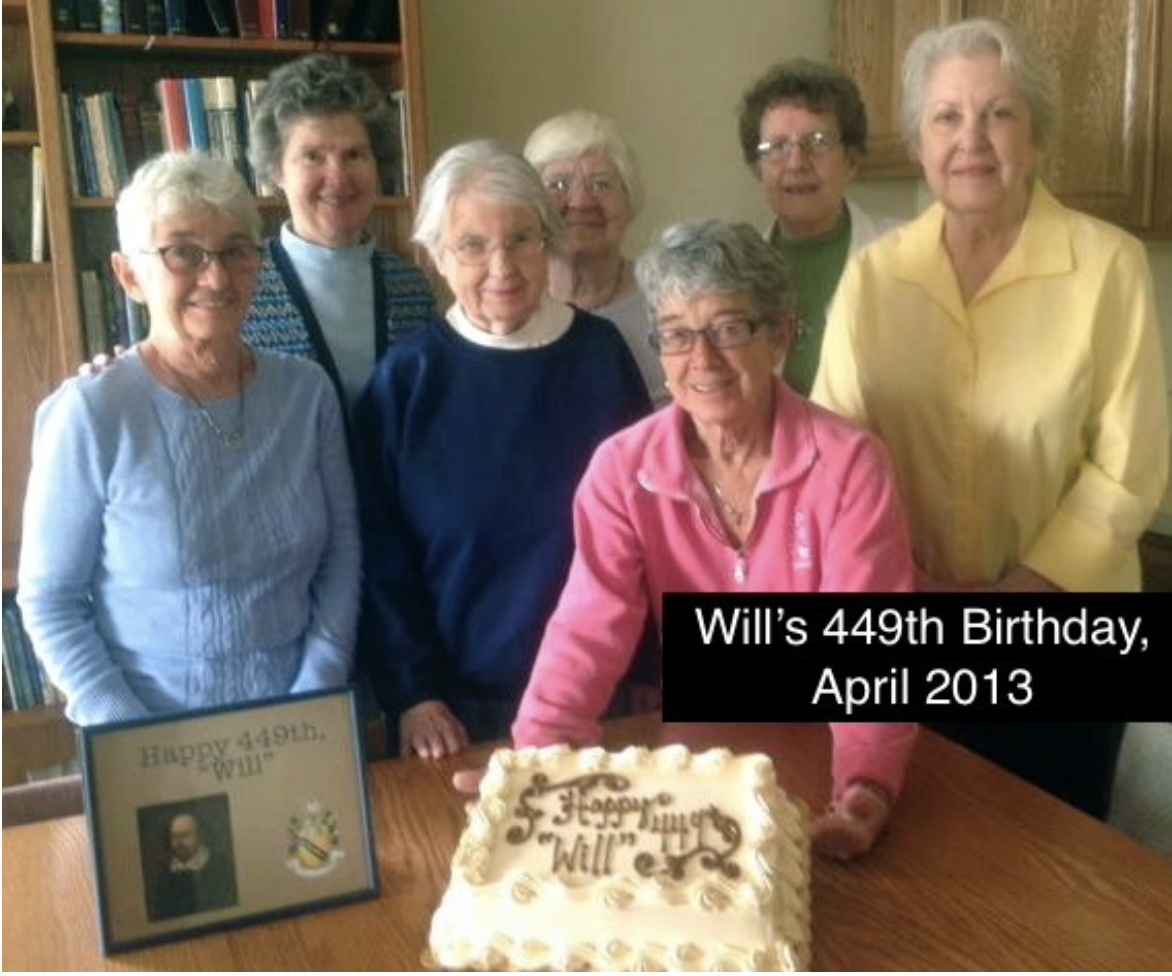The Shakespeare Club celebrates its 125th birthday!

This photograph has apparently been mislabelled since neither Florence Russell nor Emma Goodyear are included.
submitted by Joan Gaughan, Shakespeare Club
Exactly one hundred twenty-five years ago, on January 11, 1897, Mrs. Florence A. Russell and Miss Annetta English visited Mrs. Emma J. Goodyear. Their visit was no idle one, for they had in mind the serious purpose of organizing a reading club “for their mutual self-improvement and exchange of thought.” Mrs. Goodyear liked the idea, and the three ladies agreed to meet the following week on January 18 at the home of Annetta English. By then, six other women had been invited, bringing the group to nine.
What is clear from the Minutes which began to be kept at this very early stage and which are housed at both the Manchester District Library and at the Bentley Library in Ann Arbor is that this was to be no ordinary group of women sipping tea and sharing local gossip. It was at this second meeting that the basic structure of what became the Shakespeare Reading Club was established. It would be a women’s club that would meet every Monday afternoon from 2:00 to 4:00 from the third Monday in October to the last Monday in April. The meetings were to be held in the members’ homes in alphabetical order. Three officers were to be elected by secret ballot — a president, a vice-president and secretary/treasurer. The membership was limited to twelve but there would be honorary members. Members were to be admitted by invitation. The candidate was to be voted on by the members and one dissenting vote would exclude the candidate.
Whether it was at the first meeting at Mrs. Goodyear’s house or at the second meeting that William Shakespeare was taken as the focus of the group’s interest is unknown. Why they chose Shakespeare rather than some other notable person is also unknown. What is clear is that they took the Bard’s works so seriously that a rather unusual office was created — that of Critic, to be appointed by the president at the end of each month. The Critic’s job was to get Shakespearean pronunciation correct and to point out the changed meanings of some words. Shakespeare’s term, “incontinent”, e.g., would have meant ‘instantly’ or ‘immediately’. “Gravity” would have been pronounced with a long ā, and “groats” which was an English silver coin, would have been pronounced as if it were “grawts.” The group would also become familiar with the mythological and historical references in Shakespeare. Geographical locations would be identified … where was Coventry from London, for instance, or Sussex or St. Albans or Chatham? Who was Saint Alban’s and why was the place named for him?
At the next two meetings on January 25 and February 1, the women read the first and second acts of King John which “captivated our childish fancy and in imagination we reveled in battles, and marriages and coronations.” That they started with the history plays is also interesting. Sensing that women would ultimately be able to vote and thus hold public office, the history plays led them to discuss the desirable qualities of a ruler. By the end of that first year, they would also appoint a committee to acquire a set of Parliamentary procedures. When that set arrived, they would devote a part of every meeting to drills on the proper procedures for conducting meetings.
It was at the February 15 meeting that they realized that they were old enough to have a name. Florence Case suggested Shakespeare Reading Club and “after much deep thought and discussion” they decided on that name. She became the Club’s godmother.
It was at that meeting also that they formalized the purpose of their Club:
“We … recognizing the necessity for broader culture for woman; and believing that an interchange of thought will mutually improve our usefulness at home and abroad, do hereby unite ourselves as a Woman’s club, for the sole purpose of study and mutual improvement.”
Purpose (1) To gain a knowledge of the works of Shakespeare (2) To become familiar with other literature and history (3) To foster a broader culture through interchange of thought (4) To increase our knowledge in all areas of interest.”
The Club colors were rose pink and white.
Since that meeting, the Club’s Purpose, which has been printed on little booklets listing the program of each meeting, has not changed.
At the earlier meeting on January 18, the women had also developed an agenda for each meeting that reveals the seriousness of their purpose. There would be a discussion of Current Events 2-2:30. Select Reading 2:30-2:40, a selection from Shakespeare 2:40 – 3:55, and Roll Call 3:55-4:00. The quotation for the Roll Call was to be from Shakespeare.
To read the Club’s discussions of Current Events is, quite literally, to read a history of the United States as seen through the eyes of intelligent women who were interested not only in the headlines but what lay behind them. And they discovered details that are rarely included in standard history books. At the meeting on October 18, 1897, for instance, the Minutes note that the United States had made a proposal to Denmark to purchase Greenland – a proposal that met with as little enthusiasm then as it did when President Trump broached it in 2020. There was also serious consideration to split Alaska into two territories; one to retain the name the name ‘Alaska’ and the other to be named ‘Lincoln’.
Although they had no vote and could not seriously affect policy, at one point, the Shakespeare Club and the Saturday Afternoon Club debated the question of whether China was better off under its monarchy or would it be better ruled by the Powers. (Sun yat-Sen’s revolution, which turned China into a republic, did not occur until 1911.)
Occasionally, the Club has not only discussed the news but recently, it has become a part of it. For the last three years, a major topic in the Club’s Current Events has been the fate of Paul Whelan, the son of one of the current members, Rosemary Whelan, who keeps us updated on Paul who, as residents of Manchester probably know, is currently imprisoned by Russia at Mordovia, a camp roughly 350 miles from Moscow.
The Select Reading became an interesting item that a member had read but it also could be a musical presentation by one of the members or a poem that one of them had written. The selection from Shakespeare originally was an entire Act or several scenes from a play, but this part of the program eventually became a presentation on some topic of interest by one of the members. In current years, the presentations have been on topics ranging from Agatha Christie and Martin Luther’s wife to travelogues focusing on a place that a member has visited. One of the latest presentations was by Ray Berg on the history of Manchester with emphasis on its Black citizens.
At the meeting of November 16 of that year, the Club formed a committee of three members to draft a Constitution and By-Laws to govern itself. About the same time, on January 3, 1898, Florence Case presented a mallet to the club. The wood was furnished by her husband and carved by Harry Calhoun. The mallet is now also held by the Manchester Library.
Early in the Club’s history the office of Critic was abolished and one can understand why. It could have caused disagreements but without the internet, the task would have been rather overwhelming in an era when women’s chores were far more time-consuming than they are now. Thanks to Sparks Publishing, Shakespeare’s plays are now available with a transcription in modern English next to the original Shakespearean text. One can only imagine the relief that might have been for the former Critic.
Little has changed since the Club’s inauguration in 1897. The Constitution and By-laws adopted on January 5, 1898, were not modified until 2005. They are now in the process of further modification. In both cases, the changes were minor. The Minutes which were originally written in the script of each Club secretary and read at the meetings are now typed and sent out to the members via email. Meetings are still held from October to May but on the second and fourth Tuesday of each month from 1:00 to 3:00. Rather than being held in members’ homes, the meetings are now held in the library of the United Methodist Church. The exception was during the 2020-2021 season when the Covid pandemic forced meetings by Zoom, arranged by the current Club Secretary-Treasurer. There are currently eight active members and four associate members.
The topics for this season include: the Oracle of Delphi, Mary Oliver, Victorian Culture, English Costume Through the Centuries, the Wonder of Birds, Written and Unwritten Rules for Women’s Dress and Beyond, and Horses of America.
Any questions or comments about the Club are welcome. Feel free to contact Joan Gaughan at allgaughan@yahoo.com.

A 2013 photo of Shakespeare Reading Club members. Front L-R: Sandy Livesay, Jane Korth, Chris Johnson. Back row L-R: Franci Van der Schalie, Rosemary Whelan, Carol Boone and Shirley Carpenter. Photo courtesy of Carol Boone.








You must be logged in to post a comment Login